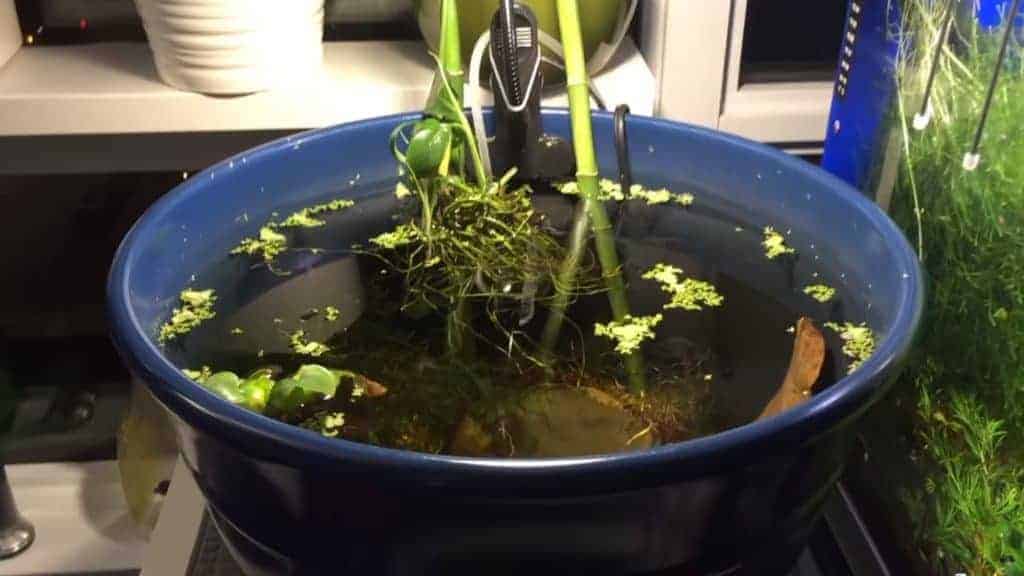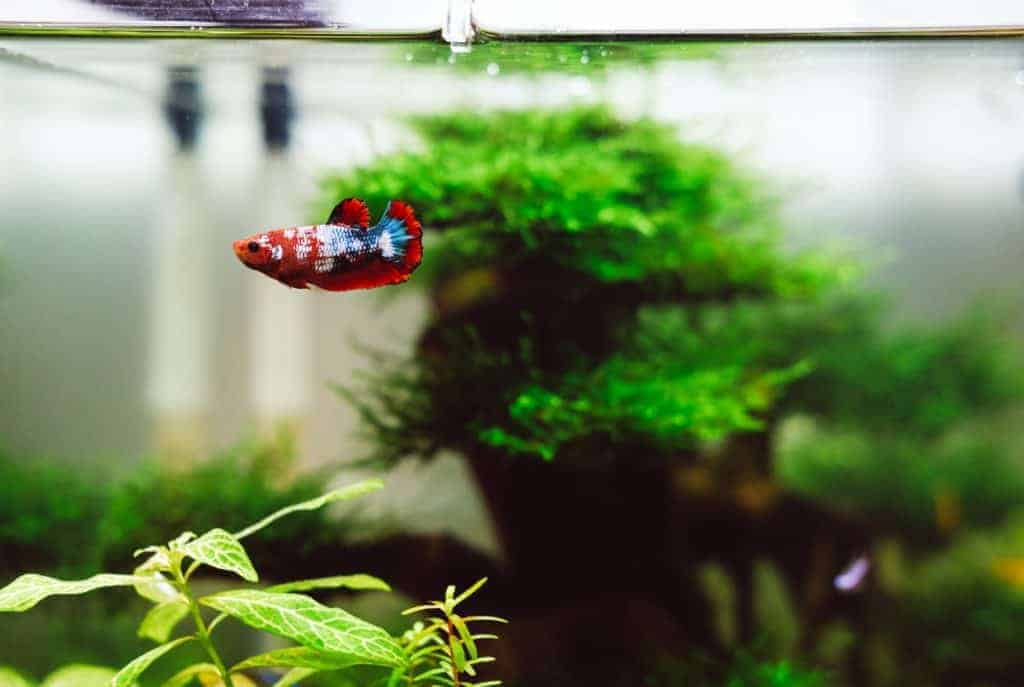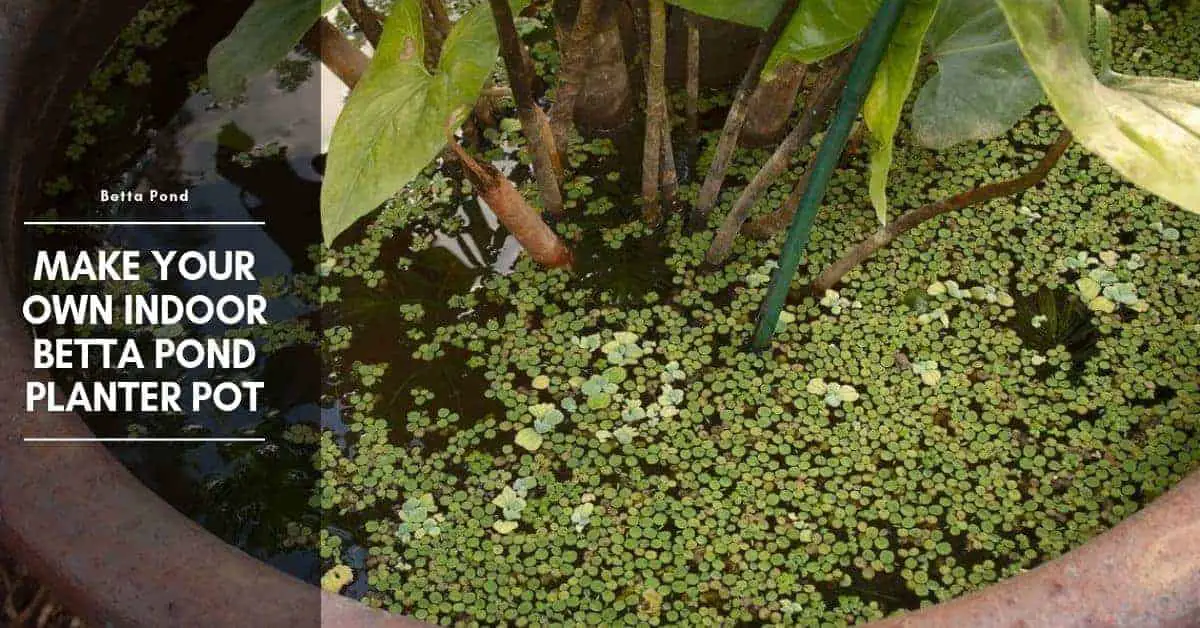In this post, I wanted to describe to you my setup for a Betta fish pond. Instead of keeping them in the usual clear aquarium, I wanted to try and set up an environment that would give them more privacy and be more like their natural habitat.

What should be the size of the betta pond planter pot?
In nature, fish don’t have transparent walls like in an aquarium tank. Usually, they’re in a body of water where the only light that is visible is from above. In my setup, I have resin planter pot, that I got it at Amazon for about 40$. This one is about 16 inches in diameter and 14 inches high. it’s a good size and it doesn’t take up too much space. Make sure you find one that doesn’t have holes, and that can hold water. Some might have drainage holes which won’t be good. This planter holds about 8 gallons of water.
Can Betta Fish Live in a Pond?
I wouldn’t recommend putting any fish in tiny bowls or tanks. Smaller tanks will obviously, have less space for them to swim and also the ammonia buildup from their waste will be quicker. It’ll be a lot happier with at least five gallons or more. If you get a bigger planter you can place it on the floor, in my case, I put it on a simple side table.
This works well for small fish like single betta, I wouldn’t recommend putting goldfish in anything smaller than 20 gallons, they have a lot of waste compared to a betta fish. Contrary to what you may have read, Bettas would prefer to live in bigger bodies of water, they’re only kept in those tiny cups at the pet store to separate them.
API STRESS COAT Aquarium Water Conditioner 16-Ounce Bottle
Tetra AquaSafe Plus, 8.45 Ounces, aquarium Water Conditioner And Dechlorinator, Model Number: 46798162681
$10.19 (as of February 1, 2026 04:27 GMT +03:00 - More infoProduct prices and availability are accurate as of the date/time indicated and are subject to change. Any price and availability information displayed on [relevant Amazon Site(s), as applicable] at the time of purchase will apply to the purchase of this product.)API TAP WATER CONDITIONER Aquarium Water Conditioner 16-Ounce Bottle
$8.48 (as of February 1, 2026 04:27 GMT +03:00 - More infoProduct prices and availability are accurate as of the date/time indicated and are subject to change. Any price and availability information displayed on [relevant Amazon Site(s), as applicable] at the time of purchase will apply to the purchase of this product.)
Larger tanks not only make it better for them but for you, the water temperature will remain more constant and the water will be less toxic since there’s more of it to dilute their waste, meaningless water changes and as neat as it may appear to put them in one of those half-gallon containers in comparison to a human, would you like to live in a small bedroom for the rest of your life? or versus a bigger apartment or a house.
I think these planter pots are not only affordable but with the right size, they’ll be much more comfortable for betta fish compared to those one-gallon little fishbowls.
What is the best substrate for the betta pond?
For the bottom of the pond, I’m using Flourite natural substrate – make sure you rinse it thoroughly since it can be very muddy. Rinse it until the water is crystal clear and before putting your fish in it, make sure you add water conditioner to get rid of some of the chemicals from your tap water.
Add beneficial bacteria to pot
When setting up a new aquarium, it won’t have the vital beneficial bacteria needed to break down the ammonia that comes from your fishes waste. Because of that, you either have to seed it from an already established tank or add something like Seachem stability. If you already have an established tank, you can just squeeze some of the water from your sponge filter into the new tank to jumpstart the bacterial growth.
Check the ammonia levels
Try to always check the ammonia levels of your newly established environment. Don’t overfeed as tempting as it is to feed more they’ll have more waste and which will translate to more ammonia in the water. For a filter, I have a simple sponge filter driven by an air pump punch filter or perfect for betta since the water flow is very low. Since betta fish is tropical fish, they do prefer warmer water so a heater is advised.
A light source for the pond planter pot
For a light source, I’m using clip-on LED light from Amazon. For plants, I have lucky bamboo sticks along with a hardy water lily, single water hyacinth, some duckweed, Tiger Lotus and some Java moss in the planter.
Add almond leaf and cleanup crew
Another thing you might add for bettas is Indian almond leaf, which is very good for them. live plants help filter the water and also provide some hiding places for your fish to feel safe. Along with living plants, you can put some snails in there to act as the cleanup crew. Some tanks have snails and shrimps because they really help get rid of the excess food and algae on the sides of the walls.
Acclimation
Before adding Bettas to the pond, acclamation will get them used to the new water temperature and composition you can then carefully scoop them out and transfer them to their new home. They’ll probably seem timid and want to hide but in a few hours, they’ll thank you for giving them a bigger pond.
Add transparent cover sheet
One thing to note is that Bettas are known to jump from their tanks. Personally, from my own experience, I have seen it happen. In the wild, they may be in low tide or in a pond or some sort of puddle that is drying out and they’ve learned to instinctively survive by puddle jumping and because of that, they could potentially jump out of your aquarium.
Summary
I change about 25% of the water weekly and I try not to overfeed them, just a few pellets a day should do it. Remember, water for fish is their life and if they don’t have clean fresh water they won’t be able to thrive.
I hope this gives you some ideas for setting up a home for your betta fish instead of the typical clear aquariums. With a nicely set up environment, your fish will be a lot happier and live comfortably.

Hi, my name is Sean, and I’m the primary writer on the site. I’m blogging mostly about freshwater and saltwater aquariums, fish, invertebrates, and plants. I’m experienced in the fishkeeping hobby for many years. Over the years I have kept many tanks, and have recently begun getting more serious in wanting to become a professional aquarist. All my knowledge comes from experience and reading forums and a lot of informative sites. In pursuit of becoming a professional, I also want to inspire as many people as I can to pick up this hobby and keep the public interest growing.
Read more about Sean.
Please join also my Facebook group.




















